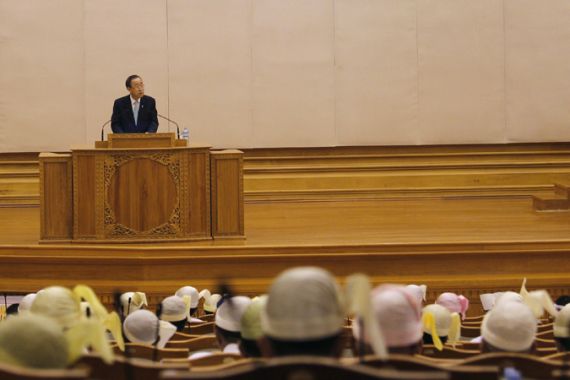Suu Kyi agrees to take legislative oath
Myanmar opposition leader says dispute over wording of oath of office has been resolved, as UN chief addresses assembly.

Aung San Suu Kyi, the leader of Myanmar’s opposition National League for Democracy (NLD), says that a dispute over the wording of the country’s parliamentary oath of office has been resolved.
Suu Kyi’s announcement came just minutes before Ban Ki-moon, the UN secretary-general, became the first foreign dignitary to address the parliament, in the capital Naypyidaw, on Monday. NLD legislators were not present in the assembly during Ban’s speech.
Speaking in Yangon on Monday, she said that NLD politicians, who had refused to pledge to “safeguard” the constitution the party has vowed to amend, would be taking their oaths of office and sitting in parliament for the first time “as soon as possible”.
Suu Kyi is expected to take the oath on Wednesday.
The party had earlier stated that it wanted the word “safeguard” replaced with “respect,” a change made in other Myanmar laws.
The Nobel laureate said that the oath would now be taken, with the word “safeguard” left unamended, because it was “the desire of the people” to see the dispute resolved, AFP news agency reported.
“Our voters voted for us because they want to see us in parliament,” she said.
Al Jazeera’s Veronica Pedrosa, reporting from Bangkok, said that Suu Kyi, however, had made it clear that the NLD still strongly rejected the wording of the oath.
The party has long campaigned against the military-drafted constitution, which gives the military wide-ranging powers, including the ability to appoint key cabinet members, take control of the country through a state of emergency and occupy a quarter of the seats in parliament.
NLD members swept April 1 by-elections, winning 43 out of 44 available seats. Suu Kyi will be among those present in parliament.
UN chief meets president
Ban, the UN chief, told the parliament during his address that “more needs to be done” by the international community to ease sanctions against Myanmar.
“Today, I return to a new Myanmar, a Myanmar that is making history. The dramatic changes sweeping Myanmar have inspired the world,” Ban said.
“I urge the international community to go even further in lifting, suspending, or easing trade restrictions and other sanctions,” he added.
Earlier on Monday, Ban met Thein Sein, Myanmar’s president, offering international aid to reform the long-isolated country.
| Increased diplomatic engagement is one of many signs of renewed ties between Myanmar and the West |
The UN chief, who is on his first visit to the country since the military loosened its grip on power and allowed civilian politicians back into the government, described Thein Sein, a former general, as a “key driver” of reforms.
“I would like to extend a warm welcome from the people of Myanmar,” said Thein Sein as the pair met at the official presidential residence in Naypyidaw on Monday.
Ban said that he would urge Western countries to further ease sanctions on Myanmar.
“We need to support Myanmar so it doesn’t slide back down the scale,” Ban told reporters on Sunday, the first day of a three-day visit.
Ban is expected during his visit to urge further steps towards democracy and appeal for unfettered humanitarian access to tens of thousands of refugees who have fled ethnic conflict.
The UN leader will meet Suu Kyi in Yangon on Tuesday.
Al Jazeera’s Pedrosa reported that while the top UN diplomat’s visit was “full of symbolism” for the country’s military rulers, “ordinary Myanmar citizens may not feel the same way”.
“The foreign diplomats who are queuing up at the door of Myanmar have got a lot of work to do if they really want the tidal wave of aid that they’re bringing into the country to really make a difference,” she said.
Government reforms
Ban last visited the country in July 2009, when Senior General Than Shwe ruled the country as part of a government that brutally supressed dissent.
With former fourth-in-command Thein Sein now in charge, the government has eased media censorship, legalised trade unions, freed more than 600 political prisoners and begun an economic overhaul.
It has also struck ceasefire deals with ethnic rebel armies fighting for autonomy.
As a result of the reforms, the European Union, the US, Australia and Canada have eased some sanctions against the country in recent weeks, a move that Ban says would allow the UN to increase its role in Myanmar’s development.
On Monday, he signed an agreement offering UN technical support for the country’s first census since 1983.
Ban is due to travel to Shan state, one of the world’s biggest opium-growing regions, to assess moves to eradicate poppy cultivation.
He is also set to meet Thura Shwe Mann, a former general who is currently the speaker of the lower house of parliament. Ban will also see government negotiators who are leading peace talks with rebels.
Catherine Ashton, the EU’s foreign policy chief, is also in Myanmar for talks with Thein Sein, after the recent suspension of EU sanctions.
Ashton met Suu Kyi on Saturday and opened a new EU office in Yangon that will mostly oversee the management of aid programmes, but will also have a political role.
Guido Westerwelle, the German foreign minister, also pledged his country’s support for reform in Myanmar. He met Suu Kyi on Sunday, after arriving in the country for the first trip by a German foreign minister in 25 years.
“We want to support sustainable reforms. We know that this is not guaranteed yet but this is our main message: Germany stands ready to support the people of your country. We want to support the people and a sustainable way for democracy, freedom and the rule of law,” Westerwelle said in a news conference after meeting Suu Kyi.